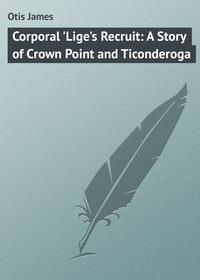
The Boy Spies of Philadelphia
"It would be better for the cause if more were of your way of thinking," Greene said in a low tone, and added quickly, "What do you propose to do now?"
"Enlist."
"In what branch of the service?"
"I would like to be with Seth Graydon, and, if possible, shall join his company."
"What does Master Ludwick say to that plan?"
"He has gone to consult with his father, and I am waiting here for his return."
"If he finds old Chris, and complains because he has not been rewarded, I predict that he will come back with a sore body, for our baker-general is a true-blooded American even though he was born in Germany, and will not have any patience with such ideas as his son entertains. Tell me, Enoch Ball, would you be willing to serve your country in another way than by becoming a soldier?"
"I would do anything in my power."
"Now more than ever is it necessary we should know all that is being done in Philadelphia. Clinton is soon to take command of the British army, and no one can guess what his policy will be. It would not be safe for Seth Graydon to volunteer for such work, because the Britishers would hang him off-hand if he ever fell into their clutches; I'm not certain I could trust Master Ludwick implicitly, but I would like you for a comrade."
"But I am known in town."
"Not to so many that it would interfere with your doing all that might be required. If you should return home at once – this very day – it would not be difficult to persuade suspicious ones that you had never left the city."
Enoch was almost frightened by the proposition. He understood how much danger would be attached to such work, and fancied the enemy knew perfectly well who had carried the first information to General Lafayette; but yet he replied in as firm a tone as he could assume:
"I am ready to do anything, or go anywhere that is best for the cause."
"It is bravely spoken, my boy. Do not fear that the enemy are looking for you; I question very much if General Howe or his officers have the slightest idea that any information was carried to General Lafayette, save by the country people who saw the forces on the march. Will you be ready to go back with me this evening?"
"Yes; I only want to see Seth and Jacob a moment, and it is not really necessary I should do even that, for I could leave word I would soon come back."
"There is no reason why you shouldn't wait till Master Ludwick returns, and then I will show you where Seth's regiment is encamped."
Greene seated himself on the ground as if perfectly willing to remain there any length of time, and after tying the horse's bridle to the wheel of a cannon Enoch sat down beside the spy.
"How long have you been doing this kind of work?" he asked.
"Playing the spy, do you mean? I began last fall, when our army went into winter-quarters. There was some fear then that General Howe might take a notion to stir our folks up at a time when they were having about all they could do to keep body and soul together, without thinking of fighting, and I volunteered for the work. It seemed dangerous at first, as it now does to you; but I soon got over that idea, and grew to like the task."
"You would be hanged if captured?"
"True, and it is not a pleasant way of going out of the world; but I am in no more danger of death than if I went into a battle, and some one must do the work."
"Yet Seth was captured the very first time he tried to give our friends information."
"That may be accounted for by the fact that he was not a spy; if he had been he would never have allowed the Continentals to escort him where he might be seen by the enemy. A man engaged in such business does not take any unnecessary chances, and is always on the alert lest his true character be discovered. That which I propose you shall do, however, is not as dangerous as it now appears, and I am positive you will not dislike it. Tell me, have you seen nothing since you met the army to dispel the supposed charm of a soldier's life?"
"I never thought there could be any sport in being a soldier, and what I have seen is only such as I have believed was the fact. Why is it that I have not met more officers?"
"Perhaps because Lafayette's advance was not considered an important movement, and, therefore, he had only his own staff with him. You would see plenty of generals by staying here a few days, and some of them as useless as they are gaudy in dress."
"It seems that you are not friendly with all of them," Enoch said with a smile.
"I am only a private, therefore could not be on intimate terms with the most humble of them; but I have seen very much, and heard more, since I began to play the spy, that shakes my faith in some of the officers under General Washington, and the one I most distrust is he who is next in rank to the commander-in-chief."
"What do you mean?" and now Enoch's curiosity was excited.
"Hark ye, lad, it is not for me to speak against my superior officer, whether he be a captain or a general, but if you and I are to work together you should know it, for I want you to keep your ears open very wide whenever his name is mentioned, particularly by those who are enemies to the cause. He it is that I fear more than I do Howe or Clinton."
"What is his name?"
Greene bent forward that he might whisper in his comrade's ear:
"Charles Lee, senior major-general under our Washington."
"I have heard of him."
"Where?" the spy asked eagerly, as if believing he might hear something to still further confirm his suspicions.
"I can't say; but perhaps it was no more than the mention of his name as one of General Washington's officers. Tell me about him."
"As I said before, it does not become a soldier to speak ill of his superior officer; but you shall hear what the world knows about General Lee. He was formerly in the British army, and served under Burgoyne in Portugal, where he was made lieutenant-colonel. He was with Braddock when that officer was defeated on the banks of the Monongahela, and with Abercrombie at Ticonderoga. After that he lived for some time with the Mohawk Indians, and was such a restless, jealous, quarrelsome man that they gave him the name 'Boiling Water.' He left the king's service, and came over here in '73, claiming to be in sympathy with the colonists, and succeeding so well in his pretensions, or his faith, whichever you choose to call it, that when the Continental army was organized he received a commission as major-general. That didn't satisfy him, patriot though he claimed to be, and he demanded that Congress make good to him any loss he might sustain by reason of having given up his commission with the British army. In '76 Congress loaned him thirty thousand dollars, without any security other than his own name on a bond."
"He got a good price for his services. Why, even General Washington himself hasn't been given that much!"
"No, nor any part of it, outside of his pay. Now what has Lee done for the cause? When General Washington was pursued across New Jersey in '76 by Cornwallis, Lee followed with a heavy force; but although called upon again and again by the commander-in-chief to strike a blow at the pursuers, he refused to obey – or neglected to do so, which amounts to the same thing."
"Why?"
"Perhaps because he hoped some disaster would befall General Washington, and he be given command of the army. Then, long after Cornwallis gave up the chase, Lee hung around New Jersey until he found a chance – that's the way I put it – found a chance to be captured by a small British scouting party, and was taken prisoner to New York. He was soon hand in glove with General Howe and his officers, and there are many of our people who say he told all he knew regarding our condition and plans. Then came the farce of exchanging him for some officer we had captured, and only two weeks or less ago he showed his cloven foot again, according to my way of thinking."
"In what way?"
"The Congress ordered that the oath of allegiance be administered to the officers here at Valley Forge before the beginning of the campaign, and Lee was forced to come up with the others. When he and two or three more had their hands on the Bible, he took his off when General Washington began to read the oath. The commander waited for him to put his hand back, and he withdrew it again before the words could be read. Then General Washington asked what he meant, and he said – these are the very words as they were told me by one who was there – 'As to King George I am ready enough to absolve myself from all allegiance to him, but I have some scruples about the Prince of Wales.'"
"What did he mean by that?"
"According to my idea it was only an excuse to get out of taking the oath, but those present seemed to think it only one of his odd traits, and passed it over as something not to be remembered. I bear it in mind, though, and want you to do the same if you are ever where it is possible to learn anything regarding him."
"But it isn't the duty of a private to watch his superior officers," Enoch ventured to suggest.
"It is in this case, for I look on General Charles Lee as a man who can, and will, if he gets the chance, do more against the cause than even Howe himself."
Enoch was impressed by what Greene had told him; but he did not believe it could ever be possible for him to detect an officer, second in rank only to the commander-in-chief, in treasonable practices. Besides, it appeared to him a very disgraceful duty to impose upon a boy who was not yet a soldier, and, perhaps, would have remonstrated, but that Jacob appeared just at that moment.
Master Ludwick was not looking particularly cheerful, and Greene whispered as he approached:
"I'll venture to say that old Chris the baker has been giving his son a lesson on the patriotic idea of expecting a rich reward whenever he chances to be of service to the cause. Old Chris isn't that sort of a man."
It seemed very much as if the spy was correct in his guess, for Jacob had nothing more to say against enlisting, but appeared anxious to know when Enoch proposed to sign the rolls.
"Have you decided to do so?"
"Yes," was the curt reply.
"To-night?"
"If I don't there won't be much chance of getting rations."
"But I thought you counted on staying with your father?"
"I have changed my mind," Jacob replied as if the subject was not a pleasant one.
"What have you done with your horse?"
"Father thought he ought to be turned over to the army, and then I couldn't be accused of stealing him for my own benefit."
"I reckon I'd better do the same thing," Enoch said, trying not to smile when Greene indulged in an expressive wink. "Where can it be done?"
"I'll show you the ropes, or, what is better, do the business for you," the spy replied. "I reckon you want to see Seth Graydon a spell before we leave?"
"That is what I would like to do."
"Go in that direction," and Greene pointed to the right, "until you have passed a lot of cannon; then turn to the left, and you'll be in the midst of the Jersey boys. I shall find you there, and we'll call on General Dickinson before starting."
"What did he mean?" Jacob asked as the spy walked away with Mr. Wharton's steed. "Are you counting on going anywhere?"
Enoch explained to his comrade what it was Greene had proposed, and concluded by saying:
"We'll have a talk with Seth. If he thinks I can really be of as much service in the city as here, I shall go."
"And I'll be with you! This enlisting ain't what I've always thought it was, and if I can get out of camp without father's knowing it, I'll be all right."
"Without his knowing it? Do you think he would object to your going back?"
"I don't think anything about it, 'cause I know. There's no need of telling any one else, Enoch, but he raised an awful row when I talked about being an officer, and when I said I guessed I wouldn't enlist he flew into a terrible rage. He acted as if it would just suit him for me to be marched out somewhere and shot at."
It was with difficulty Enoch could refrain from laughing at the disconsolate expression on Jacob's face; but he succeeded in checking his mirth sufficiently to say in a sympathetic tone:
"Of course he doesn't want you shot, Jacob; but you must remember how much your father has done for the cause, and I suppose it made him angry when you spoke of being paid for the little we did last night."
"Made him angry? Why, he flew way off, an' I thought one spell that he was going to flog me. If I can get away when you do, it'll be all right."
"I have been told that it isn't possible to walk out of a military camp whenever you choose. You must have a pass, or something of that kind."
"We didn't have any trouble to get in here."
"Not after we told who we were and that we intended to enlist."
"You said that; I didn't."
"Yes; but you came in, and I don't think it will be very easy to get out again unless your father knows you are going."
"Then I shall stay here as long as I live, except that fellow Greene would be willing to say I could do a deal of good in the city. Will you ask him?"
Enoch promised to do as his friend wished, but at the same time he did not believe the spy would be very eager for this addition to the party.
The boys had been walking during the conversation, and by the time it was concluded they had passed the artillery park, arriving at that portion of the encampment where the New Jersey troops were quartered.
Seth was on the lookout for them, and the warmth of his greeting was particularly pleasing to Master Ludwick, who felt decidedly sore in mind.
CHAPTER X.
CONCILIATORY BILLS
That Seth was proud of being an officer in the Continental army both Jacob and Enoch understood during the first hour spent in his company. The fact was clearly apparent in his manner of showing them around the encampment, explaining the location of the different troops, the routine of a soldier's life, and displaying his proficiency in the manual of arms.
"I never had an idea that there was so much to be learned before a fellow could make any show as a soldier," he said when, the exhibition drill being ended, he led the two boys to his quarters. "It seemed to me only necessary to stand in line, or be able to load a musket; but that is a very small portion of the work."
"I suppose you know it all by this time," Jacob said in an envious tone.
"Indeed I don't. I have only just begun to learn; but if I'm not a good soldier within a year, it will be because peace is declared too soon, or I have been wounded or killed. The members of our company are well trained, and seem willing to help me along."
"If I couldn't find out all there was for a private to know in a week, I'd give up trying," Master Ludwick declared emphatically.
"Then you may as well never try."
"I'm not certain that I shall."
"What?" and Seth looked thoroughly astonished. "I thought your greatest desire was to enlist?"
"I've changed my mind about that since last night."
"Since last night? Why, after what you two have done it seems as if the only thing left was to enlist. You surely can't go back to Philadelphia – "
"That isn't so certain. Enoch is going with Greene, the spy, and if I can give father the slip I shall travel in his company."
As a matter of course Seth was eager to understand what Master Ludwick meant, and in the fewest possible words Enoch explained the proposition that had been made to him.
"I suppose of course it's your duty to go if you can be of any service," Seth said slowly; "but I have counted so much on having you and Jacob for comrades that it will be a big disappointment. It is too bad for you not to be members of the army now when it seems as if the end of the struggle was close at hand."
"What has happened to make you think anything of that kind is near?" Enoch asked in surprise. "Philadelphia is still in the possession of the British; General Washington has not moved from these his winter-quarters, and at the very beginning of the campaign General Lafayette has been forced to retreat."
"But the alliance will make a great difference. Now that we are to have the assistance of the French troops – "
"What do you mean?" and both Enoch and Jacob looked bewildered.
"Haven't you heard that the French king has acknowledged the independence of the United States, and declares that he will befriend us?"
"I knew last winter it was hoped such might be the case, but don't understand that anything has been effected toward that end as yet."
"Then General Howe has succeeded in keeping the news from our people better than I supposed possible. You should have been in camp here from the third to the seventh of this month, and then you would have understood what hopes every one is building upon the alliance. It was announced to the army on the third, and on the seventh the soldiers celebrated the good news."
"I wish our friends in Philadelphia could know of it," Enoch said, half to himself.
"They will know before a great while, that you may depend upon. It is rumored here that war is to be declared between France and England, and that what are called 'conciliatory bills' have been offered in Parliament."
"What do you mean by conciliatory bills?" Enoch asked in perplexity.
"As it has been explained to me, the British government will make peace with the colonies – "
"That is what the king will try to do," a voice cried, and, looking up, the boys saw Greene, the spy, who had approached near enough to overhear a portion of the conversation without having been seen. "Nothing short of our independence will, I hope, please our leaders. The bills you speak of are merely deceptionary measures, so General Washington says. The king will give us a little more liberty than we have had; but doesn't propose to allow us to become a nation by ourselves. You don't seem to be aware of how well we are progressing, Enoch, my boy. The French king has declared himself our friend; there is no question but that war will soon be proclaimed between France and England, and what more particularly concerns you is, that the British are making preparations to evacuate Philadelphia."
Enoch and Jacob looked at the speaker in surprise which bordered on bewilderment.
"Do you mean that General Howe will march out of the city when there is no necessity of his doing so?"
"He will unquestionably march out very shortly; but there is good reason for the move. He has accomplished nothing by remaining there, and fears he may find himself in trouble. Four days before the carnival Howe issued an order for the heavy baggage of the army to be prepared for embarkation at the shortest notice, and for the soldiers to lighten their personal luggage. If that doesn't mean that the Britishers are getting ready for some kind of a move I'm very much mistaken. There is yet more news for you, boys. It is evidently a fact that peace commissioners have been appointed by the king, and are now on their way to this country."
"Can that be possible?" Enoch asked, and Seth nodded his head triumphantly as he replied:
"You should have been here at Valley Forge to learn the news, not in the city where the Britishers suppress everything that isn't pleasing. There can be no question about the commissioners, as Mr. Greene says, for it is reported in the army that Washington wrote to Congress regarding the conciliatory bills and the fact that the commissioners are coming to this country, saying in the letter: 'Nothing short of independence, it appears to me, will do. A peace on any other terms would, if I may be allowed the expression, be a peace of war.' You can see we are progressing famously, and that the time is come when the king realizes how nearly we have gained our independence."
"Then if I go to the city with Mr. Greene I may be fortunate enough to see the Britishers marching out?"
"Who can say but that you will be the first to bring the news to this army that the capital of our country is no longer in possession of the enemy?" the spy added in a triumphant tone. "Now, I fancy, Master Ball, you will have no hesitation about doing as I wish?"
"I am ready to go whenever you say the word."
"Then it is time we were making a move. General Dickinson wants to have a word with you before we go, and I propose to set out as soon as your interview is ended."
"What about my going too?" Jacob asked eagerly. "Surely I have been able to do as much as Enoch – perhaps more, for he is willing to confess that but for me he would never have known where to get horses for last night's ride."
"That matter is already settled, Master Ludwick," Greene replied with just a suspicion of a smile. "I committed to your father's care the horse Enoch rode, for it would have cost me too much time to have turned him over to the quartermaster in due form, and then promised that I would not countenance your leaving camp."
"So my father had an idea I would want to go?"
"Yes, when he learned I was to take Enoch."
"He may think he can keep me here; but I doubt it," Master Ludwick said sharply. "It will be necessary for him to watch me very closely, because it doesn't appear to be such a hard matter to give him the slip."
"You may think differently after making the attempt. Do you fancy the men here are allowed to roam about at will?"
"I reckon I shouldn't have much trouble in getting away if I tried hard."
"You will soon learn to the contrary, if you make the attempt. At all events I am bound by my promise not to allow you to accompany Enoch and I. Seth, if you want to send any word to your mother we may have an opportunity of speaking with her before many days."
"If Enoch sees her he knows what I would say. I am more than contented, for I am happy at being a soldier at last, and hope before this campaign ends I shall have done that which will prove I am true to the cause."
Greene was not disposed to make any further delay.
His instructions were to be in Philadelphia before the following morning, and since at least half of the journey must be made on foot, there was no more than sufficient time remaining to accomplish his purpose.
Seth and Jacob accompanied Enoch to General Dickinson's quarters, and waited outside until his interview with the commander of the New Jersey militia was at an end.
"What did he say to you?" Master Ludwick asked when Enoch finally emerged from the building.
"Nothing of much importance that I am at liberty to repeat," Enoch replied guardedly. "He thanked you and I for what we did last night – "
"I should think it was about time somebody thanked us," Jacob grumbled.
"Surely General Lafayette spoke very kindly."
"Yes; but that is all he did do."
"Well, General Dickinson didn't say very much more, and surely our night's work wasn't so dangerous after all."
"Weren't we chased and fired at?"
"Yes; but not hit."
"Then I suppose if we had been killed they would have thought we had done something wonderful," Jacob grumbled.
Enoch did not care to enter into any argument with his friend concerning a matter which, in his opinion, had already been fully discussed, and put an end to the conversation by extending his hands to his comrades as he said:
"Good-by, fellows! If nothing happens to me, and the Britishers do leave Philadelphia, you'll see me precious soon after they have gone."
"Try mighty hard to be the first to bring us the news," Seth said in a cheery tone as he pressed Enoch's hand warmly, and Jacob added:
"You two fellows seem to be having all the luck, even though I am the one who does most of the work."
"You get just as much luck as any of us," Enoch replied, "and perhaps more than Seth did, for he had to walk all the way to Valley Forge, and you rode. Now you have a good opportunity to enlist, and I hope you will do so instead of moping because matters are not exactly to your liking."
Then Master Ball, motioning to Greene that he was ready for the journey, set off down the path which led to the main road.
"That boy of Ludwick's has got something in him if he would only give it a fair chance to come out," the spy said when they were a short distance away. "The trouble with him is that he made up his mind he had done a wonderful thing in bringing information of the enemy's movements last night, and counted so surely on being given a commission as a reward that it has unfitted him for ordinary duties."









